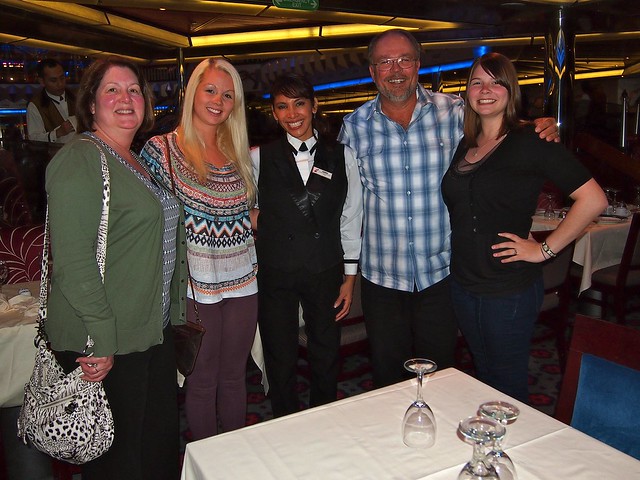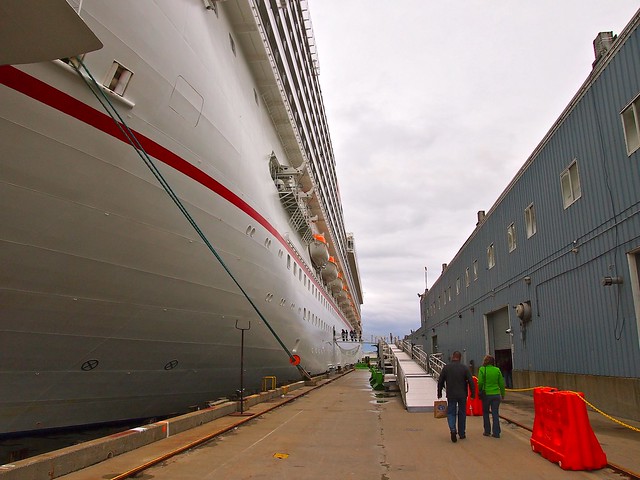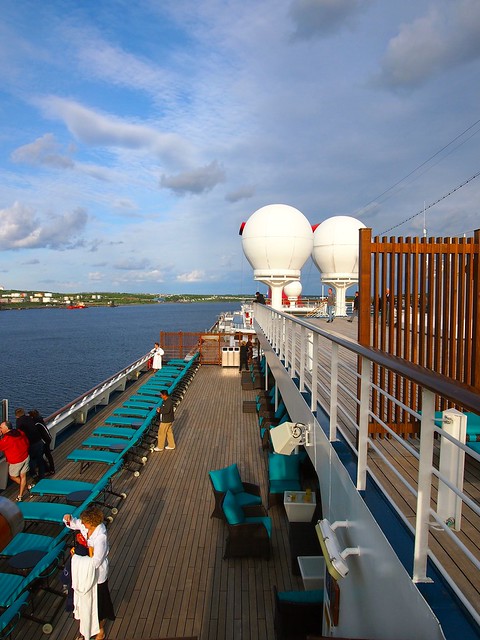Meet Giannina
Meet Giannina.
She is 34 years old and a native of Lima, Peru. She is one of six children, and was named after one of her mother's favorite soap opera characters. She has been married and divorced once, and has a 7-year-old daughter. She only sees this daughter for 2 months out of every year — and no, she's not a criminal or refugee or anything like that.
For the past 10 years, Giannina has been employed on cruise ships.
Currently, she is working as a head waiter on the Carnival Glory, which is where I met her while sailing through New England and the Canadian Maritimes with my family.

I've been on cruises before, and have struck up conversations with everyone from waiters to room attendants. But Giannina is probably the first cruise employee that I feel like I really got to know, and so I want to share her story. Because her story is the story of the majority of cruise ship employees, and deserves to be told.
I meet Giannina around 8:15 p.m. on June 4, 2012 — my family's first night dining in the Platinum Lounge on the Carnival Glory. We're all gussied up in our fanciest cruise wear, and Giannina greets us with a big, beautiful smile.
“Call me Nina,” she says as she neatly places cloth napkins across our laps and hands us menus with a flourish.
We get to know Nina over the next few days. She tells us about her mother and daughter back home in Peru. She tells us about her Bulgarian boyfriend, who also works aboard the ship. She tells us Alaska is her favorite place she's ever cruised to. And she tells us about what it's really like to work aboard a cruise ship when you aren't a Westerner with white skin.
Cruise ship contracts usually last between 6 and 8 months. In between contracts, Nina gets two months off to go home and see her family. Because she holds a Peruvian passport, she must have a flight booked for the exact day her contract expires, and must leave whatever U.S. port she ends up in immediately. No dawdling. No deserting.
Not that she would desert, of course. Even though she's been doing this for 10 years, Nina wants to eventually go back to Peru. Maybe use her skills and saved-up money to open up a restaurant.
“I do want to go home,” she says.
But not everyone does, she admits. There are more than 50 countries represented by the employees just onboard the Glory alone.
“There are people here from countries I didn't even know existed,” Nina jokes.
Many of these countries are poor, third-world countries. And, sometimes, “home” isn't somewhere people want to return to. One night, Nina tells us about a Haitian man who works aboard the ship. She says Carnival avoids hiring people from countries experiencing especially bad political or social turmoil because of the chance of them deserting. This particular man was brought aboard at the beginning of his contract in handcuffs until he handed over his passport to the powers that be on board. When he leaves the ship, he must have an escort at all times — just in case.
My dad is incredulous. “No way,” he says.
Yes, Nina insists. “For some people, they see this job as a way out.”
It certainly gets me thinking. Especially when Nina shares her salary with us.
Along with receiving free room and board on the ship, Nina and most of her crewmates are paid $75 per month. Seventy-five dollars. That's it. They rely on gratuities and tips for the rest of their wage.
Carnival automatically charges guests a gratuity — an amount that gives a head waiter like Nina perhaps $2 per day per guest that she serves. Pennies in my mind. And some cruise lines don't even charge this mandatory gratuity — in many cases, employees like Nina are at the mercy of the passengers that they serve.
I am rather appalled by this. Having worked in a restaurant before, I know how stingy people can be when it comes to tipping.
But Nina assures us that she makes a good living working aboard ships like the Glory. She takes care of her mother and daughter back home, and is helping to put her brother through school. She also makes enough extra to set aside to work towards that restaurant dream of hers and cover other expenses.
Carnival — like many cruise lines — registers most of its ships in Panama in order to get around U.S. taxes and labor laws. On the one hand, this is beneficial for someone like Nina, since none of her earnings are taxed. But on the other hand, this means she must pay for her own healthcare and other expenses, such as flying home at the end of her contract.
We ask Nina how she began working on cruise ships to begin with. She tells us that the major cruise lines recruit from all over the world, and that she simply went to one of their “casting calls.” She tells us it was a bold move for her to leave home for this job.
“I'm kind of like the black sheep of the family,” she says. “Where I'm from, girls aren't supposed to leave home until they're married. But I went to work on a ship, and eventually came home with a 4-months-pregnant belly.”
Nina talks about her daughter often, mentioning how she'd love to take her to Disney World someday. But, even though Nina could easily afford to pay for her family to join her on a cruise, U.S. beuracracy has kept her from doing so. Her mother and daughter have been unable to get visas to come to America.
“They probably think I'm going to desert and that we'll try to stay,” she says matter-of-factly. I'm not sure how to respond, because I know she's right.
Nina has been trying for at least a year to get visas for her mother and daughter. It's a time-consuming, expensive process, and they've already been turned down twice.
“We can try again in a few months, though,” she says, not at all daunted. “When it's meant to happen, it will happen.”

Over the course of a week, my family falls in love with Nina. It's not hard to do, of course. With that big smile and a quick wit about her, you can't help but like her.
I begin trying to put myself in her shoes — in the shoes of someone not quite as lucky and privileged as I am to have grown up in America, with a passport in my pocket that will gain me entry just about anywhere. I feel guilty, almost. I know I have taken this fact for granted in the past.
Nina knows the power of my passport, too. When I tell her I'm working on a master's degree in hospitality and tourism management, she tells me I should come work on a cruise ship.
“You'd get a good job because you're American,” she says. “You'd probably be my boss.”
I don't doubt her, but I also don't feel good about that fact. That, just because of that little blue passport and the address inside it, I'd somehow be more qualified than her, despite her being older and more experienced.
But Nina assures us this is a good job for her, and for many of the crew aboard who come from countries where the U.S. dollar is still very strong. She tells us she makes better money serving cruise ship passengers than she would doing anything back at home.
We ask Nina what she'd be doing now in Peru if she had never made the decision to leave 10 years ago. She doesn't even skip a beat to think about it.
“If I wasn't doing this, I'd probably be married to a chauvinist husband and have six kids,” she said. “I wouldn't have finished school, and I'd probably just be a mommy.”
If given the chance, she says she'd make the same choice again.
Meeting Nina and chatting with her every night in that fancy dining room, knowing she probably makes less in a month than I do during some weeks, made me think about a lot of things.
It made me wonder if I was helping perpetuate an unfair, exploitative system employed by the cruise lines to save a few bucks, or if I was instead helping some of these people feed their families and pursue their dreams. It's a fine line, and I'm still not entirely sure which side I ended up on.
Most of all, though, spending time with Nina made me realize how incredibly lucky I am. Lucky to have been born in the U.S. Lucky to have gotten a good education. Lucky to be able to travel wherever I want, whenever I want.
And lucky to be able to meet people like Nina on my travels.
My dad tells her she should write a book about her life and working on cruise ships.
She laughs and says it would have too many chapters.
What's your take? How do you view huge transnational tourism companies who employ people like Nina for pennies? Are these companies helping or hurting the people they hire?

Amanda Williams is the award-winning blogger behind A Dangerous Business Travel Blog. She has traveled to more than 60 countries on 6 continents from her home base in Ohio, specializing in experiential and thoughtful travel through the US, Europe, and rest of the world. Amanda only shares tips based on her personal experiences and places she's actually traveled!













Wow! We just went on our 1st Carnival Cruise and were wondering how that worked out. There were so many staff from all over the world. They were so nice, although it seemed they worked really long hours. I know when we were in Cozumel the dollar was worth $20. I multiplied that by $75 and that comes to $1500 a month. But while there is no room & board to pay during that time, did she mention if she pays for food?
I would assume meals would be included in the “board” part of room and board, but I’m not positive!
Okay, I ran the numbers according to the article and I did a bit of checking in Peruvian statistics.
Yes, she is, to Western eyes, grossly underpaid.
So I worked the numbers on offer. Nina makes $75 per month from the cruise. She also gets tips according to the blog hostess, something like $2 per person per day from the mandatory gratuities.
So, if she has three dinner seatings at a table of 8, she has 24 patrons. Even the kids pay gratuities. But let’s call it 20 to make the math easier.
$2 x 20 patrons x 30 days = $1,200 per month after tips and not including that $75 per month. Call that her living expenses.
Now, according to Nina, she works 10 months a year, so that means $12,000 per year.
Which seems like pretty poor wages even so. Below the poverty level of many Americans.
But she is not American.
So a dollar is worth 3.35 PEN. So she is making about 4020 PEN per month with no or few expenses.
What is the average wage in Peru? Well, low skilled labor, which includes waitresses, is 1350 PEN. She makes 4,000 PEN.
What about high skill wages? They make around 4,000 PEN. So to put it into perspective, she is earning what a Peruvian computer programmer is paid with none of the expenses that he faces regarding rent, transport, healthcare, food, taxes etc.
High skilled wages every month with no expenses or taxes. That is not a bad deal at all.
This is not to dismiss the separation from her family. It is real and palpable. And plane tickets are spendy, though I believe the cruise line helps get them deep discounts if they don’t actually pay for them.
So how does one make MORE money as a waitress on a cruise ship?
Well, if she were unscrupulous, which of course the fair Nina isn’t, she could whip up a story (true or not) about how poor and oppressed she is for the correct audience to garner more tips…*
Surely I can’t be the FIRST person to think that or actually do the math.
*That being said, I would be enough of a sucker to leave her a nice tip as well. But not more than $75 for the wait staff.
I wouldn’t call anyone a “sucker” to leave a nice tip for someone working service anywhere, regardless of where they’re from. I grew up in the US, so tipping is just a natural thing for me – and I’ve also *worked* as a server, and I know how tough of a job it can be.
And I should point out that the tip you leave for the crew on a cruise ship doesn’t *always* go directly to your server – sometimes they are divided up equally among all the staff unless you personally give the money to your server.
Thanks so much for sharing Nina’s story. It was really interesting to read. You can’t really blame a company for trying to operate in the most profitable way possible as long as they can find employees willing to work for what they pay. Although, I can’t imagine it would be worth the hassle of hiring someone like the guy from Haiti that they were so worried about deserting.
Yeah, that’s why it’s such a tricky thing to judge. The employees aren’t being mistreated, though, so at least there’s that.
We just got home from a cruise and found a similar story from a most intelligent, charismatic & talented, woman. My heart aches for her because of what she has missed out on by being apart from her family ( though I also realize she could be doing worse). It’s difficult to make equitable comparisons because even with their room, board & taxes being “free” for them, their $75 has to also support their families back home where rent is NOT free; and for those like Nina, can u really put a price on missing out on seeing your child grow up? I am especially thankful of all the perks of living in the US, having an education, my career & most of all being able to spend every day with my family. This trip was really an eye opener. Our new friend told us of passengers being rude ( “I paid for this cruise, I own this room, I own you!”) and if complaints are made about them and they get reassigned, they are not paid for the rooms they get reassigned to as some form of punishment. They are NOT supported by their supervisors because the customer is always right. They get no sick days, no days off, and are restricted to where they can go on the ship. There is a distinction in “classes”- staff can roam the ship & get off at ports…..”crew” are restricted to their work area and below the ship, and are not allowed to leave the ship unless they have business-like a dental appointment. If they are too sick to work they do not get paid for that day and they must also pay for the person that covered their shift. Before gratuity was mandatory, passengers were known to falsify complaints just to avoid paying the gratuity- I got this first hand from my grandmother who knew people who did that. And I have to say, many Americans I met on this trip were way more ignorant than the “third world country” people that served us. I do realize it can be an ideal job for some and that it provides others with steady income at an honest job, so my hope is that they have ever increasing fair & decent work conditions in the near future. Thank you for posting, I am quite impressed with u young lady. God bless!
Thanks so much for sharing your experience, too! It certainly does make you think about a lot of things. It’s difficult to completely write off cruises, though, because of these employment practices. Because, of course, things could be much worse for some of these people at home. You just have to be a good example when you go on cruises yourself!
Sounds like you’re better off than some people living in the US anyway. Certainly more than me. The little blue passport with an American address inside it doesn’t allow me to travel ‘wherever I want, whenever I want.’ I also don’t have the luxury of parents to pay for my college and take me on cruise vacations. So, I guess I’ll be stuck working in a menial job and being pitied by people like you. Cry me a river. Best of luck with your Master’s degree, boss.
Thanks for that.
Never thought they only get $75 per month. I was under the impression that people working on cruise ships are all well-compensated at the very least.
Thanks for sharing Nina’s story!
You learn a lot when you talk to people on your travels! I never knew this, either.
The problem is not the money. Neither the long hours. The real problem is how stupid are american passengers. They do most ridiculous questions, they ask for the impossible, they are very impatient. I’ve worked in 7 ships, but never two contracts in a row. With the money I save I go backpacking around the world. I know, I might be lucky compared to this peruvian girl. I had quit a couple of times, but I feel sorry for those that really need the job to support their families at home. I’m glad I was not born in the US. I would prefer to be european, like my grandparents. Western Europe is so much better than US and nobody ever put me any trouble when I travel there. They are not afraid that Im going to stay illegal. They are so much smarter and polite, even as passengers. And they have knowledge, something most americans lack.
It’s sad to hear this, but I can totally understand what you mean. Americans do tend to feel like they are entitled to a lot of things – and this includes when they travel.
Oh dear what a story of this braveheart named Nina! I myself from an hotel background and from F&B service with an experience of more than 20 years. It is still a dream of mine to work in a luxury cruiseliner though I am in my early 40’s (42 precisely), I still yearn for my dream to realise someday. I have heard mixed stories about working in a cruiseship from my former colleagues and acquaintants.
cheers and good luck Nina
I have heard mixed things, too, though I still think it would be an interesting experience to have for a while. Good luck realizing that dream of yours!
[…] selon les services rendus) mais comme l’a découvert cette jeune voyageuse américaine en discutant avec une serveuse, les pourboires sont la principale source de revenu du personnel d’hôtellerie à […]
Perspective is a wonderful thing, we should actually use it sometimes instead of just saying it’s an atrocity that they’re being paid $75 a month.
By putting it in perspective it’s like saying US restaurants pay their workers $0 a month on average, and that they’re not making any money, which is just flat out not true!
Rent: Free
Meals: Free
Utilities: Free
Taxes: Non-existent.
When you take your AVERAGE American household, over 90% of their income is going towards: rent, utilities, food, and taxes. None of which Giannina has to pay!
At the end of the day assuming she makes $90 per day in tips( 3 meals x 15 passengers served) she is making way more than your Average AMERICAN makes per year! That is using a conservative estimate, she could easily be serving 30-60 passengers a day if she’s the top waitress.
Remember, no taxes, no rent, no utilities, no car payments, no expenses for the most part.
Everyone claiming how little these employees are paid need to put it in perspective.
I’m not saying they’re being grossly overpaid, but to say they’re under-paid is a significant stretch of the truth.
I’m not sure it’s a huge stretch of the truth, really. She has to pay for her own health coverage, as well as her transport to/from home when she has time off the ship. So it’s not like she has ZERO expenses to pay… And there are some days when she wouldn’t be making any money in tips, because there are no passengers on the ship.
Great read! I knew salaries were low but had no idea that they were that low. If it would help for companies to charge a little more to adequately pay their employees, I’d be willing to pay more. Many cruise lines have really affordable vacations depending on where you go and when and I bet a lot of people have no clue just how little employees make. Thanks for opening my eyes.
I feel like a lot of people have no idea just how little these employees are paid – I myself had no idea!
She sounds like an incredibly powerful woman, I’m grateful that you brought her story here.
All throughout your post, I felt I never want to take a cruise with that company. Then came the part of how she’s making enough for so many expensive goals. Plus the life she has now versus the life she could have had – unable to get an education, living under the ruling of a man. So I feel the same conflict you do – if we don’t go because these employees don’t get fair conditions, will we be hurting them more than we’ll be hurting the company that abuses their need for those $75 + tips?
When it comes to companies like this, I think that people can choose to look at the possibilities of other companies, that might give their employees better conditions (I so hope such companies exist). We do enable it. It’s a double-edge sword. Clothes created cheaply, cocoa gathered for chocolate making, that handcuff story from this boat…. so many times, it is done in abusive conditions so that we can consume. And as long as we consume, there won’t be a reason to stop the abuse. Since it’s not likely the Western world will stop consuming any time soon, the least I feel I can personally do is learn more about it, which is my intention, and do my best to consume more fairly.
Yup, it certainly is a double-edged sword, like you said. But, unfortunately, unless there’s a massive shift in society, things like this aren’t likely to go away anytime soon.
Love this post! We had a similar experience during our cruise around the Mediterranean and the staff were mostly from the Philippines. They only get to see their family for 3 months out of the year as well and they’re so happy to have the opportunity to work on the cruise ship. Their story is moving as is that of Nina. Thanks for sharing this. Helps keep us grounded and humble.. 🙂
It’s always good to be grounded and humble. 🙂